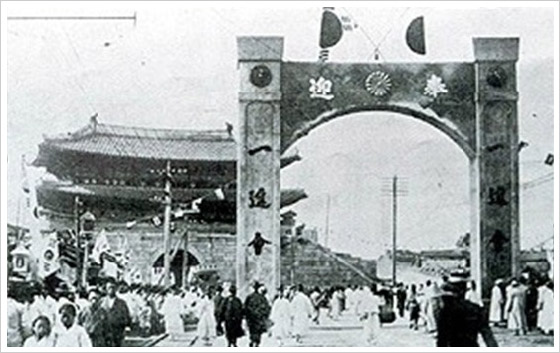Iljinhoe on:
[Wikipedia]
[Google]
[Amazon]
 The Iljinhoe (一進會; 일진회) was a nationwide organization in Korea formed on August 8, 1904. A Japanese record states the number of party members was about 800,000, but another survey record by the Japanese
The Iljinhoe (一進會; 일진회) was a nationwide organization in Korea formed on August 8, 1904. A Japanese record states the number of party members was about 800,000, but another survey record by the Japanese
Doosan Encyclopedia The group was disbanded on September 26, 1910, a month after the Japan-Korea Annexation Treaty. He is considered a traitor in modern day Korea. In 2006, a South Korean presidential committee announced the names of 120 people suspected of collaborating with Japan during its annexation rule of Korea. The list included 27 members of Iljinhoe, all of whom allegedly took the lead in suppressing Korean troops and supporting Japan-Korea annexation. The people on the list will face investigation on suspicion of conducting traitorous pro-Japanese activities during the 1904-1919 period, although no prosecutions will take place as the people implicated have long since died.
2006 KBS article
 The Iljinhoe (一進會; 일진회) was a nationwide organization in Korea formed on August 8, 1904. A Japanese record states the number of party members was about 800,000, but another survey record by the Japanese
The Iljinhoe (一進會; 일진회) was a nationwide organization in Korea formed on August 8, 1904. A Japanese record states the number of party members was about 800,000, but another survey record by the Japanese Resident-General of Korea
The Japanese resident-general of Korea ( ja, 韓国統監, Kankokutōkan; ko, 일본의 대 한국통감, Ilbon-ui dae hangugtong-gam) was the leader of Korea under Japanese rule from 1905 to 1910. This post was highly hated among native Korea ...
in 1910 shows the number was about 90,000. After seeing the failure of Korea's isolationism, the party claimed that Korea could not develop capitalism
Capitalism is an economic system based on the private ownership of the means of production and their operation for Profit (economics), profit. Central characteristics of capitalism include capital accumulation, competitive markets, pric ...
on its own, and demanded a merger with the Japanese Empire
The also known as the Japanese Empire or Imperial Japan, was a historical nation-state and great power that existed from the Meiji Restoration in 1868 until the enactment of the post-World War II 1947 constitution and subsequent forma ...
. Song Byeong-jun
Song Byeong-jun (Korean:송병준, hanja:宋秉畯, August 20, 1857 – February 1, 1925) was a Korean Joseon dynasty politician, noted for his role in the Japan–Korea Treaty of 1910. His clan was the Eunjin Song clan. His literary name was Jea ...
(송병준), the leader of the group and a high-ranking official in the Korean government before the Japan-Korea Annexation Treaty actively pushed ahead the annexation and received a title of nobility from the Japanese government in 1920.Doosan Encyclopedia The group was disbanded on September 26, 1910, a month after the Japan-Korea Annexation Treaty. He is considered a traitor in modern day Korea. In 2006, a South Korean presidential committee announced the names of 120 people suspected of collaborating with Japan during its annexation rule of Korea. The list included 27 members of Iljinhoe, all of whom allegedly took the lead in suppressing Korean troops and supporting Japan-Korea annexation. The people on the list will face investigation on suspicion of conducting traitorous pro-Japanese activities during the 1904-1919 period, although no prosecutions will take place as the people implicated have long since died.
2006 KBS article
See also
*Chinilpa
''Chinilpa'' ( ko, 친일파, lit. "pro-Japan faction") is a derogatory Korean language term that denotes ethnic Koreans who collaborated with Imperial Japan during the protectorate period of the Korean Empire from 1905 and its colonial rule in K ...
* Japan-Korea Annexation Treaty
*Korea under Japanese rule
Between 1910 and 1945, Korea was ruled as a part of the Empire of Japan. Joseon Korea had come into the Japanese sphere of influence with the Japan–Korea Treaty of 1876; a complex coalition of the Meiji government, military, and business offic ...
References
External links
* The Statement On The Annexation By Iljinhoe: The statement concerning Japanese annexation of Korea (Wikisource - Chinese and Japanese text) Korean Empire Korean collaborators with Imperial Japan Organizations established in 1904 Organizations disestablished in 1910 1904 establishments in Asia